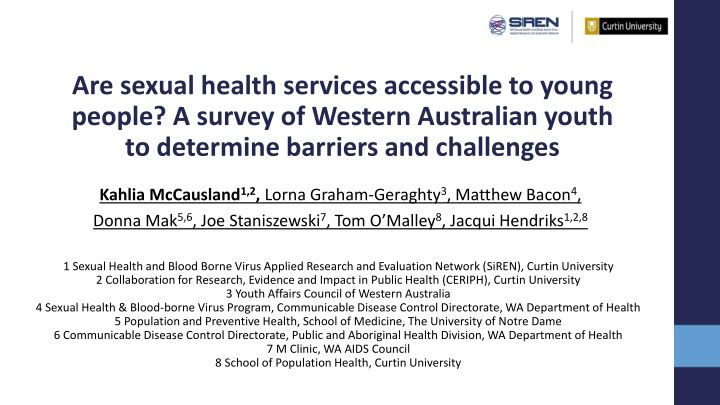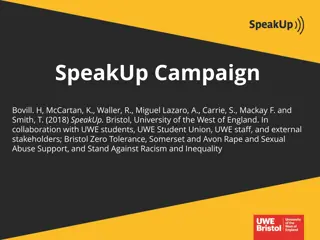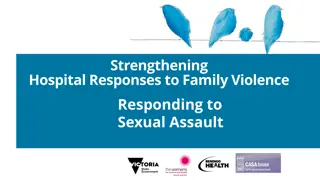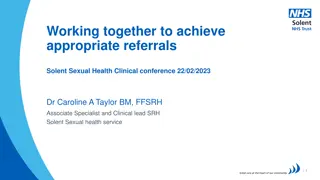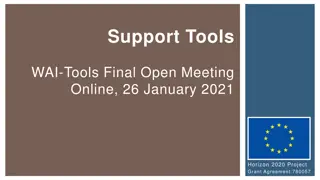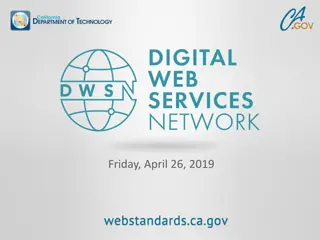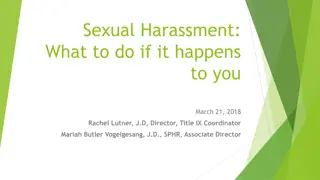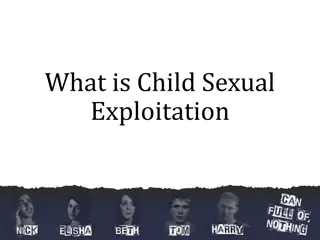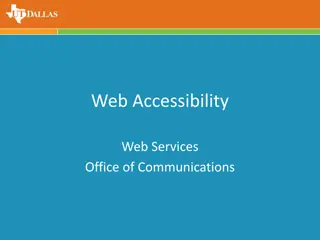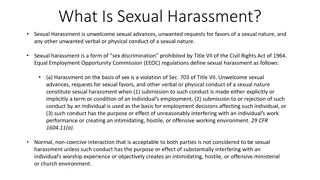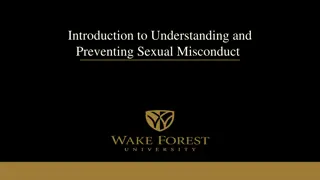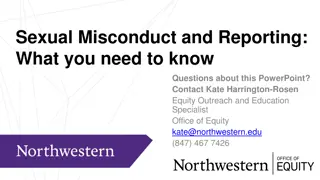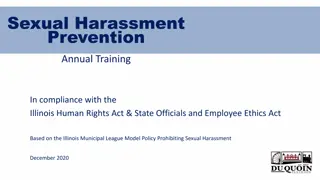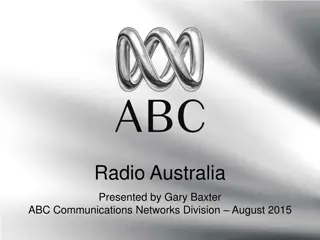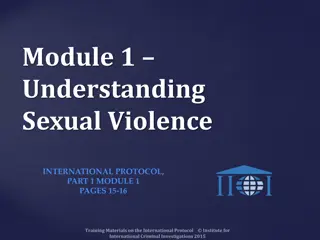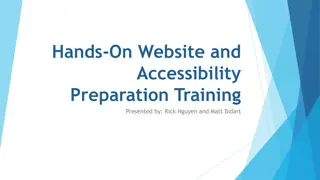Accessibility of Sexual Health Services for Young People in Western Australia
A survey conducted in Western Australia analyzed the accessibility of sexual health services for young individuals aged 16-25. The research aimed to identify barriers and challenges faced by youth in seeking sexual health care, with a focus on their experiences with healthcare professionals. Findings revealed demographic data and highlighted the importance of addressing stigma to improve access to sexual health services.
Download Presentation

Please find below an Image/Link to download the presentation.
The content on the website is provided AS IS for your information and personal use only. It may not be sold, licensed, or shared on other websites without obtaining consent from the author.If you encounter any issues during the download, it is possible that the publisher has removed the file from their server.
You are allowed to download the files provided on this website for personal or commercial use, subject to the condition that they are used lawfully. All files are the property of their respective owners.
The content on the website is provided AS IS for your information and personal use only. It may not be sold, licensed, or shared on other websites without obtaining consent from the author.
E N D
Presentation Transcript
Are sexual health services accessible to young people? A survey of Western Australian youth to determine barriers and challenges Kahlia McCausland1,2, Lorna Graham-Geraghty3, Matthew Bacon4, Donna Mak5,6, Joe Staniszewski7, Tom O Malley8, Jacqui Hendriks1,2,8 1 Sexual Health and Blood Borne Virus Applied Research and Evaluation Network (SiREN), Curtin University 2 Collaboration for Research, Evidence and Impact in Public Health (CERIPH), Curtin University 3 Youth Affairs Council of Western Australia 4 Sexual Health & Blood-borne Virus Program, Communicable Disease Control Directorate, WA Department of Health 5 Population and Preventive Health, School of Medicine, The University of Notre Dame 6 Communicable Disease Control Directorate, Public and Aboriginal Health Division, WA Department of Health 7 M Clinic, WA AIDS Council 8 School of Population Health, Curtin University
Background The stigma surrounding sexual health can make it difficult for young people to access sexual health care and support. Research surrounding young people s experience with healthcare professionals when seeking sexual health information, testing and/or treatment is limited, particularly in the Western Australian context. The project aims to investigate the predictors of STI and BBV testing among young people (16-25 years) in WA and to determine the feasibility of conducting a periodic survey. This presentation specifically examines young people s experiences with healthcare professionals to identify potential barriers to safer sex practices.
Methods Cross-sectional survey developed. Survey administered through Qualtrics from 9 Nov 2020 31 Jan 2021. Recruitment: social media, SHBBV networks, and targeted emails to relevant WA based organsations. 1,263 entries were received, of which 347 were excluded. A total sample of 916 participants was included in the analysis.
Demographics Age Region of residence 16% 0.6% 0.9% 0.9% 0.7% 0.2% 1.8%1.3% 13% 14% Metro 2.4% 12% 12% 12% Peel 11% 10% South West 10% 10% 10% 9% Great Southern Goldfields-Esperance 8% 8% Mid-West Kimberley 6% Wheatbelt 88.3% 4% 4% Pilbara 2% Aboriginal and Torres Strait Islander 4% (37). Born in Australia 73% (670), overseas 25% (230). 0% 16 17 18 19 20 21 22 23 24 25 years years years years years years years years years years
Sex, gender and sexuality 68% (620) assigned female, 31% (286) assigned male at birth. Gender identity Sexuality 2% 1% 4% 5% 8% 31% Heterosexual Bisexual Male Another identity 15% Female Gay Another identity Lesbian Unsure 67% 64%
Sexual health information, testing, treatment 77% (704) of respondents were sexually active (oral/vaginal/anal sex). 51% (465) of respondents had previously sought sexual health information, testing or treatment from a healthcare professional - most commonly a physician, doctor or nurse (90%, 417). Primary reasons for seeking care were: - Sexual health testing (58%, 270) Respondents (76%, 354) were more likely to initiate discussions regarding sexual health than their healthcare professional (21%, 97). - Safer sex practices (e.g. contraception) (44%, 206) - Sexual health information (41%, 189)
Negative experiences 25% (118) of those who had sought sexual health information, testing or treatment reported a negative experience. 25% 22% 20% 15% 13% 10% 6% 5% 0% Negative experience Asking for sexual health information Asking for STI/HIV test Receiving treatment for STI/HIV *Among participants who had sought sexual health information, testing or treatment from a healthcare professional n=465
Negative experiences 25% 19% 18% 18% 22% 18% 20% 18% 17% 14% 15% 17% 16% 16% 16% 10% 15% 15% 15% 5% 14% 14% 0% Disagree Agree I felt comfortable asking questions They made assumptions about my body or sex life I felt comfortable asking for an STI/HIV test They were judmental and made me feel ashamed They understood the issues facing sexually active young people I received sexual health care that was sensitive to my needs *Among participants who had sought sexual health information, testing or treatment from a healthcare professional n=465
Qualitative free-text responses All the doctors I've had have assumed that I am heterosexual and have sex with men. This is particularly true when I come to the doctor for other issues and they insist on prescribing me hormonal birth control, despite only being sexually attracted to other women. I find this impacts my ability to ask my doctors questions about my sexual health needs. (Female, lesbian, 19 years old) I have had occasions where a cultural difference or lack of understanding/education has led to some uncomfortable situations when asking for my regular testing procedures [every 3 months]. It hasn't affected my access to testing but I have walked away acknowledging how other individuals may feel, especially young or sexually confused individuals. (Male, gay, 20 years old) The doctor seemed to be uncomfortable whilst completing the [sexual health screening] test, and I wasn't completely sure what I was being screened for. I didn't feel comfortable asking questions, so went home and Googled information. (Female, heterosexual, 25 years old) I was made to feel like a degenerate. (Male, heterosexual, 25 years old)
Conclusion This study gave insight into the lived experiences of young people living in WA, and detailed unsatisfactory interactions with healthcare providers. These negative experiences can hinder a young person s confidence, desire and ability to seek sexual health advice, to request a sexual health test and/or access treatment. Patient pathways can be improved if providers have compassion for young people, affirm and understand diverse identities and/or cultural backgrounds, and further acquaint themselves with the issues facing sexually active young people to increase young peoples confidence and comfort when seeking sexual health care.
Acknowledgements We would like to thank the members of the Projects Advisory Group, student volunteers and the young people of Western Australia. The SiREN project is funded by the Sexual Health and Blood-borne Virus Program, Western Australian Department of Health. Dr Kahlia McCausland | kahlia.mccausland@curtin.edu.au Senior Research Officer | WA Sexual Health and Blood-borne Virus Applied Research and Evaluation Network (SiREN), Curtin University
